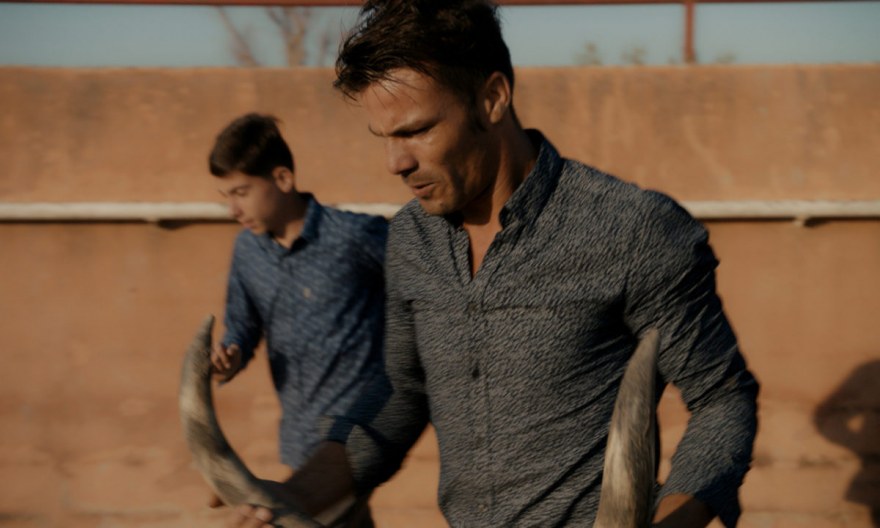Dinner with Un monde sans bêtes (Facing the Beast)
An interview with Emma Benestan and Adrien Lecouturier, directors of Un monde sans bêtes (Facing the Beast)
How did you come up with the idea to make a film about bull herders?
Adrien: We met Theo in a school in the south of France. He was different from his classmates, he dreamed of bulls.
Emma: I was doing an art residential in a middle school in the Gard and I asked Adrien to come and help me with the youth film workshop for 8th graders whom I had been working with for several months. The workshop was centered on the question of dreams, and I was conducting interviews with all the students about their dreams and nightmares. The day Adrien came to help, I was interviewing Theo. He started off by telling us that he dreamed constantly of bulls, and that sometimes when he was asleep he feared waking up to a “world without animals (un monde sans bêtes)”. Adrien and I were struck by his words and we followed him the very next day to the bull ranch where he was an apprentice during his free time. Theo, shy and disengaged and failing in school, was transformed by his contact with nature. From this was born the desire to make a film.
Did Theo really drop out of school to become a bull herder?
Emma: No, Theo didn’t drop out of school, but when we followed him during his summer holidays, he was involved in a sort of training with the bull herd of Mikaël Matray, the bull herder we followed. The last news we had, Theo had given up on the idea of becoming a bull herder.
Adrien: Theo has now taken up business studies. The bulls still represent something magical to him, a childhood space.
How long did the shooting take? And the editing?
Emma: We had 15 days of shooting over three weeks at the end of August. We had many problems, in particular with availability during the festival season and the many constraints shooting with animals, especially with wild animals. The editing took a long time. The problem was to find a way to relate in a simple and impressionistic fashion the doubts and future of Theo, a bashful teenager. The idea of the dream, which is at the origin of the film, came back to us at that moment.
Adrien: We worked from the desire to express Theo’s interior space through his rapport with nature and animals. The idea was for something invisible to spread throughout this film.
How did you work on the aesthetics and colors in Un monde sans bêtes?
Emma: In the beginning, we wanted to shoot with film. But economically, it wasn’t possible. Together, we came up with a camera, optics and grain system that produced a satisfactory result.
Adrien: To keep that temperature and range of colors, the complex part was to shoot in shifts. We would shoot from dawn to 11:00 a.m., then from 6:00 p.m. to 9:00 p.m. so as to have soft and warm light. The rest of the time, the sun crushed the greens and produced too strong of a contrast.
Why are there so few women in Un monde sans bêtes ?
Adrien: The beast in this film is a figure. The idea was to work around Theo’s interior world. The issue was not focused on men or women. The beast is a metaphorical space. Vanquish the beast as we vanquish our inner demons.
Emma: The world of bull herders is a distinctive environment where the myth of the virile man facing off against the beast has seduced numerous teenagers who signed up for a “ritual”. Passing this “ritual” was to prove oneself a “bull man”. In this film, we wanted to question this dimension by creating a contrast between the lean and childish teenage body of Theo and the sinewy and muscular body of Mikaël, who asks this young boy to continuously surpass himself and to face off with the beast. But we weren’t thinking in terms of exclusion. There is also the character of the mother.
What sort of freedom would you say the short format allows?
Adrien: This format doesn’t necessarily allow freedom. Freedom is perhaps found more in the way we tell the story.
Emma: But it’s true that without the short film format, we perhaps wouldn’t have had the time to experiment and to take our time in finishing the film.
If you’ve already been to Clermont-Ferrand, could you share with us an anecdote or story from the festival? If not, what are your expectations for this year?
Adrien: Clermont-Ferrand is a wonderful festival and it’s like a spotlight for our film. We hope it will allow the film to be seen, appreciated and come to life.
Emma: We are happy to show our film in Clermont-Ferrand and to have the opportunity to see it in a large theater with the public!
Un monde sans bêtes is being shown in National Competition F10.








